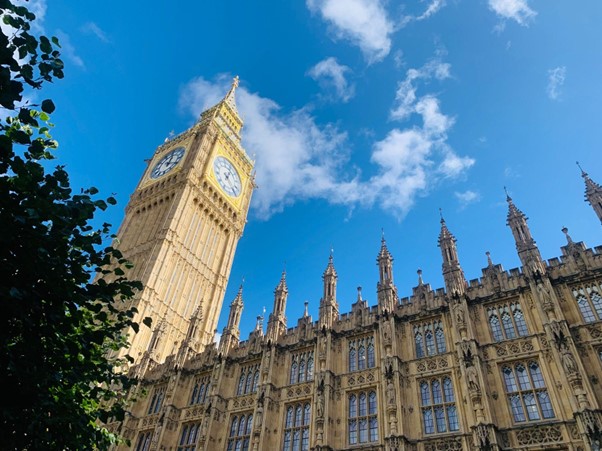Date: 11/10/2025
Author: Barbara Sherriff, University of Brighton
 Bio:
Bio:
Barbara is an ESRC funded PhD student at the University of Brighton in the School of Business and Law. She is primarily looking at the impact of employment on the wellbeing of young people in entry level and early careers’ work. Barbara has an MSc in Personnel and Development, a BSc in Psychology Studies, and is a Chartered Member of the CIPD. Her most recent role was as the Head of Central Support at the University of Sussex Students’ Union, working as interdepartmental staff lead for Human Resource Management, Equality Diversity and Inclusion, Safeguarding and Complaints.
The Palace of Westminster is home to the House of Commons, House of Lords, and globally recognised features such as the Big Ben bell in the Elizabeth Tower, with the word ‘Westminster’ synonymous with UK Parliament. When the SCDTP, funded by the Economic and Social Research Council, presented their PhD students with the opportunity to visit I jumped at the chance – what better way to see how research can interact with national politics than to visit these buildings and to hear more about the inner workings of our democracy.
We walked some of the three miles of passageways and explored some of the iconic rooms to get a sense of Westminster’s social, political and architectural history: A statue of Winston Churchill surveying the damage inflicted by the Second World War, the House of Lords’ solid gold angels and ‘woolsack’ sofa, art depicting everything from shameful moments in British empire history to this century’s installation celebrating women’s right to vote. This visit was never just about history however. We also entered the rooms where current parliamentary debates are televised, where elected members of Parliament vote, and where protests have been made during debates on issues such as Brexit and environmental action.
As part of our Westminster visit, people currently working in parliament talked about their roles and experiences. We heard from a scientist turned MP, who now also chairs the Parliamentary Office of Science and Technology (POST) board, and about their ‘deep dive’ briefings to MPs which can help support governmental decision making. We heard from an economics statistician specialist working for the House of Commons Library, in particular, how they were one of 82 experts who answered MP questions and created briefings to pre-empt future questions. We heard from the clerk responsible for scrutiny and overseeing select committees, and the role they provide to ensure that the evidence presented to MPs is not forgotten or misinterpreted. Finally, we heard from the person responsible for Social Sciences in the POST, including their role as mentor to PhD students on 3-month UKRI internships. All of these parliamentary positions are designed to make sure that politicians have access to impartial, reliable, ‘cutting edge’ information, by sourcing, collating and packaging current knowledge to inform decisions.
My former staffing role within a politically active students’ union at the University of Sussex had parallels to parliament, with permanent staff likened to civil servants and elected student officers likened to politicians within a government. My interest in the inner workings of parliament clearly stems from this employment, but it developed into a practical interest regarding how research is incorporated into political decision making at a national level. Based on these interests I recently applied for a three-month internship in the Department for Work and Pensions (wish me luck!), a process which included submitting a briefing not directly related to my PhD. My briefing linked existing evidence to suggest a role for student employment in helping to reduce graduate inequalities, a topic inspired by the government’s Areas of Research Interests relating to widening participation (Department for Education) and barriers to employment (Department for Work and Pensions). Whether or not I am successful in my application, I would recommend applying to anyone with an interest in impactful research and policy. The process creates a direct link between current research and national action, in particular by identifying questions which could be debated in parliament to instigate meaningful change.
Research pushes the boundaries of what we know, but when research clearly has the power to make significant differences to people’s lives, I get really excited. It was such a privilege to see the buildings and hear about people’s roles, chatting to staff about their day-to-day experiences in parliamentary work and listening to their insights. A massive thanks to Jane Parry (UK parliament thematic research lead) and Ajit Nayak from the University of Southampton for organising the visit, to Labour MP Satvir Kaur for sponsoring the event, to the ESRC for supporting this event, and to Lauren Sullivan, Matthew Keep, David Slater and Natasha Mutebi for taking time out of their day to talk to our group. The visit demonstrated how current research is being incorporated into parliamentary decision making and, in the future, how it might be our research that drives positive and impactful change – now that’s exciting!

Looking up at Westminster’s parliamentary buildings and a blue sky. Photo Credit: Barbara Sherriff